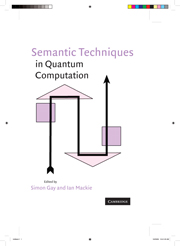Book contents
- Frontmatter
- Contents
- Contributors
- Preface
- 1 No-Cloning in Categorical Quantum Mechanics
- 2 Classical and Quantum Structuralism
- 3 Generalized Proof-Nets for Compact Categories with Biproducts
- 4 Quantum Lambda Calculus
- 5 The Quantum IO Monad
- 6 Abstract Interpretation Techniques for Quantum Computation
- 7 Extended Measurement Calculus
- 8 Predicate Transformer Semantics of Quantum Programs
- 9 The Structure of Partial Isometries
- 10 Temporal Logics for Reasoning about Quantum Systems
- 11 Specification and Verification of Quantum Protocols
- Index
Preface
Published online by Cambridge University Press: 05 July 2014
- Frontmatter
- Contents
- Contributors
- Preface
- 1 No-Cloning in Categorical Quantum Mechanics
- 2 Classical and Quantum Structuralism
- 3 Generalized Proof-Nets for Compact Categories with Biproducts
- 4 Quantum Lambda Calculus
- 5 The Quantum IO Monad
- 6 Abstract Interpretation Techniques for Quantum Computation
- 7 Extended Measurement Calculus
- 8 Predicate Transformer Semantics of Quantum Programs
- 9 The Structure of Partial Isometries
- 10 Temporal Logics for Reasoning about Quantum Systems
- 11 Specification and Verification of Quantum Protocols
- Index
Summary
The idea of quantum computation, in the algorithmic sense, originated from the suggestion by Feynman (1982) that a computer based on the principles of quantum mechanics might be capable of efficiently simulating quantum systems of interest to physicists; such simulation seems to be very difficult with classical computers. Feynman's suggestion was followed up by Deutsch (1985), who introduced the notion of the quantum Turing machine and investigated the possible computational power of physically realizable computers. He showed that a specific problem, now known as Deutsch's problem, can be solved more efficiently by a quantum algorithm than by a classical algorithm. Several years later, Shor (1994) discovered efficient quantum algorithms for two important practical problems – integer factorization and the “discrete logarithm” problem – and shortly afterwards, Grover (1996) discovered an efficient quantum algorithm for unstructured searching. Since then, quantum algorithmics and quantum complexity theory have developed into substantial and active research fields.
Meanwhile, the principles of quantum mechanics were being used as the foundation for a new approach to cryptography. Bennett and Brassard (1984) defined a protocol for key distribution whose security is guaranteed by the laws of quantum theory. Their system built on earlier work by Wiesner (1983), which remained unpublished until several years after its conception. We regard quantum cryptography as an aspect of quantum computation, in particular distributed quantum computation; alternatively, both quantum algorithmics and quantum cryptography can be viewed as branches of quantum information processing.
- Type
- Chapter
- Information
- Semantic Techniques in Quantum Computation , pp. xi - xivPublisher: Cambridge University PressPrint publication year: 2009



